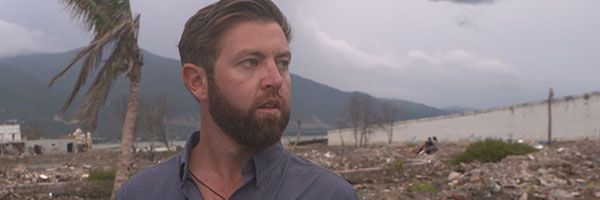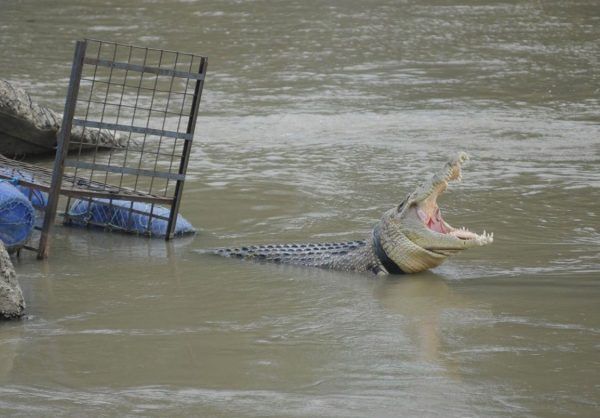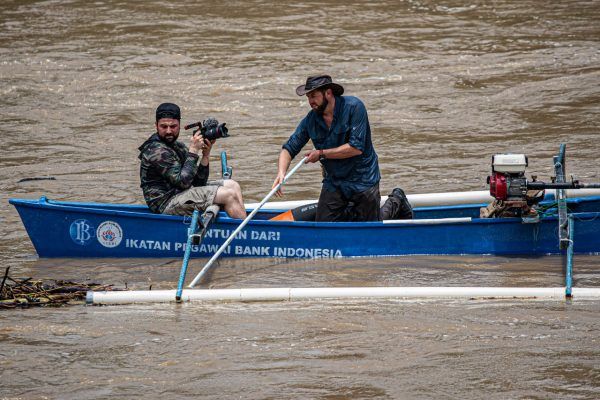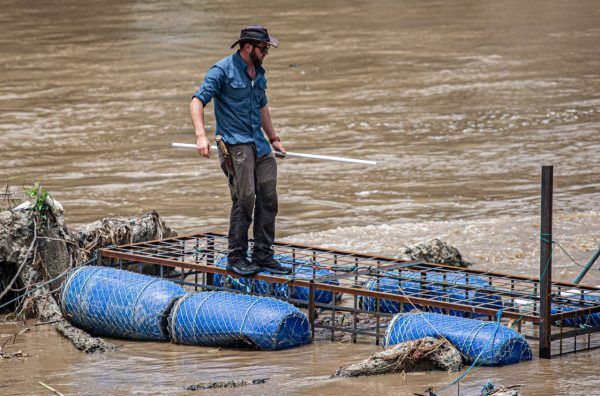I am in awe of Forrest Galante. I had the pleasure of profiling him back in January to put the spotlight on his Animal Planet show, Extinct or Alive, and he truly wowed me with his journey, work ethic and passion. Now the wildlife biologist has even more to offer. (And at this point, I’m fully convinced that the possibilities with his work are boundless.) Right in the midst of the COVID-19 pandemic, Galante flew to Palu, Indonesia to help save a crocodile with a tire stuck around its neck.
On Earth Day, Wednesday, April 22nd at 9:00pm, you’ll be able to watch Impossible Croc Rescue on Discovery. As Galante explained during a recent phone conversation, there’s a crocodile in Palu that’s had a tire stuck around its neck for four years. While that crocodile has become both an icon and a friend to the people of the region, as he grows, that tire becomes tighter and tighter, running the risk of choking him. Galante’s mission? To go to Palu to save him.
I was going to break this conversation up into a feature piece, but Galante’s account of how this documentary happened and his hopes for it are so powerful, it seemed more appropriate to bring it to you in Q&A format. You can check out the bulk of our conversation and the trailer for Impossible Croc Rescue below. Be sure to check out the documentary when it airs on Discovery tonight at 9pm. (Or set your DVR if needed!)
-
FORREST GALANTE: It's an amazing journey for a couple of reasons. One is, there's a crocodile in Palu, Indonesia that's had a tire stuck around its neck for four years. And this crocodile is iconic to the people there and he's become a friend of the people, but as he continues to grow, he's growing to the point that the tire is going to effectively choke him to death. So, my mission is to go to Palu and save him.
Now, that's all well and good, but it’s kind of a bigger story because, the way that I see it is, this crocodile is kind of symbolic for the world with regards to the fact that human pollution and garbage is becoming such a major problem, day in and day out. And I feel like this animal, this individual, showcases that on such a visual level. And if we're able to save him, to get the tire off his neck, it's so symbolic for like, it's not too late. Yeah, we've dumped trash, but look at what happens when we remove it. And I kind of see this crocodile as a symbol of hope for everyone because he's so well loved in Palu, the city that he's in in Indonesia. I'm hoping that he becomes loved by the whole world, and that the whole world embraces the symbolism behind freeing this crocodile from this piece of garbage.
I know it usually takes a good deal of time to get movies and shows off the ground, but it sounds like this story has some real urgency to it. What was it like getting the green light to do this ASAP?
GALANTE: It’s significant urgency, and it was very ASAP. My partners at Discovery Channel are the most wonderful group of people in the world. Not only do they care about wildlife and saving it, but they care about exposing it to the world, and that's why I'm so indebted to Discovery and Animal Planet for having me be a part of their family because when I brought this to their attention and said, ‘Guys, look at this thing that's going viral …’ Because basically what happened was, maybe two months ago now, three months ago, this thing all started popping up in the news when BKSDA, an Indonesian conservation organization, offered a reward for getting to the croc.
This was the first I'd ever heard of it. So I researched it. The very next day, I marched into, I will say my boss, but really my friends’ offices in Discovery and said, ‘Guys, look at this thing. We've got to do something about it.’ And they said, ‘Go do it, Forrest. We'll support you, 100%.’ And even in light of coronavirus, this is right when everything was kicking off right in March, they said, ‘If you feel confident in doing it, go and do it.’ And we hopped on a plane two or three days later to go over to Palu to try and solve this thing in light of the impending epidemic.
Everything happened between then and now - creating a show document to explain the situation, walking into the offices of Discovery, pitching it, a green light that day, on the plane the next week over to Palu and back all in the coronavirus time.
How did shooting a movie like this in the middle of a pandemic affect you production-wise? Especially with everything you've learned on your other programs. What did you not have access to this time? What precautions did you have to take?
GALANTE: Well, let me tell you that I don't want to give away the ending, but there's certainly a surprise twist due to the pandemic that nobody is expecting and it made things very, very challenging. And we turned around this entire film in just a few weeks from a post standpoint. My partner and I run a production company and we made this whole thing come together in a few weeks. We had four editors. There was only myself and two of my camera guys, two of the guys that I take with me everywhere in the world, and we filmed everything as quickly as we could, got out of there, got home, went straight into post on it, and we delivered it very recently.
Is there a reason why you chose to do it in the feature documentary style rather than breaking it out into a limited series?
GALANTE: The short answer is, this is a time-sensitive thing and it wasn't about what kind of production value we get out of this. It was much more about, this is a documentary, this is not a movie, this is not a reality show, this is a documentary to attempt to save an animal’s life that needs saving in hope that it inspires people to stop polluting around the world. And so, we went there to shoot what we got. What we got out of it is the results, if you know what I mean. If we could have made 10 episodes out of it, maybe we would have, but that was never the goal. The goal was to save the crocodile. Everything else was secondary.
Are you forced to lay low and stay home now or are there other things you might be able to tackle during this time?
Since returning from Indonesia, I have had to spend time in real quarantine, not like what everybody's doing social distancing. I got put into the real deal because I flew through China in the height of a pandemic. I'm on the other side of that now, and now that that's done, I'm continuing to consult with the organization that was involved in the crocodile rescue as well as a number of other large wildlife projects, both internationally and domestically. And as soon as travel restrictions are lifted, as soon as it's responsible, myself and my team, we'll be back on the road tackling more wildlife problems.
Not surprised to hear that one bit! [Laughs] So, someone watches this documentary when it airs and they want to do something about it, they want to do something to help. What can they do right now while we're all staying home?
GALANTE: Well, first of all, just by watching it and understanding what's going on in the rest of the world with regards to pollution, that's a huge help, educating yourself. And watching the documentary will educate you on global problems, and watching all of Discovery’s Earth Day programming on April 22nd will educate you on that. If you want to help, you want to support my efforts, by all means, follow me on socials and reach out to me. I'm very, very reachable for someone who's on television.
And most importantly, if you want to help make a difference, you can make a difference by how little you order on Amazon, right? How infrequently you take a plastic bag to the store, how much you recycle. I'm not saying you need to get on a plane and go to Palu, Indonesia in the height of an epidemic to make a difference. All you need to do is not throw a plastic bag in your garbage bin … it doesn't take one person doing sustainability perfectly to make a difference. It takes everybody doing it imperfectly to make a big difference. And that's something we can all work towards.




